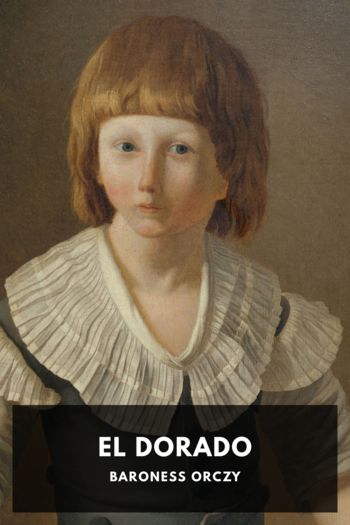El Dorado, Baroness Orczy [read the beginning after the end novel .TXT] 📗

- Author: Baroness Orczy
Book online «El Dorado, Baroness Orczy [read the beginning after the end novel .TXT] 📗». Author Baroness Orczy
Blakeney had more than one pied-à-terre in Paris, and never stayed longer than two or three days in any of these. It was not difficult for a single man, be he labourer or bourgeois, to obtain a night’s lodging, even in these most troublous times, and in any quarter of Paris, provided the rent—out of all proportion to the comfort and accommodation given—was paid ungrudgingly and in advance.
Emigration and, above all, the enormous death-roll of the past eighteen months, had emptied the apartment houses of the great city, and those who had rooms to let were only too glad of a lodger, always providing they were not in danger of being worried by the committees of their section.
The laws framed by these same committees now demanded that all keepers of lodging or apartment houses should within twenty-four hours give notice at the bureau of their individual sections of the advent of new lodgers, together with a description of the personal appearance of such lodgers, and an indication of their presumed civil status and occupation. But there was a margin of twenty-four hours, which could on pressure be extended to forty-eight, and, therefore, anyone could obtain shelter for forty-eight hours, and have no questions asked, provided he or she was willing to pay the exorbitant sum usually asked under the circumstances.
Thus Blakeney had no difficulty in securing what lodgings he wanted when he once more found himself inside Paris at somewhere about noon of that same Monday.
The thought of Hastings and Tony speeding on towards Mantes with the royal child safely held in Hastings’ arms had kept his spirits buoyant and caused him for a while to forget the terrible peril in which Armand St. Just’s thoughtless egoism had placed them both.
Blakeney was a man of abnormal physique and iron nerve, else he could never have endured the fatigues of the past twenty-four hours, from the moment when on the Sunday afternoon he began to play his part of furniture-remover at the Temple, to that when at last on Monday at noon he succeeded in persuading the sergeant at the Maillot gate that he was an honest stonemason residing at Neuilly, who was come to Paris in search of work.
After that matters became more simple. Terribly footsore, though he would never have admitted it, hungry and weary, he turned into an unpretentious eating-house and ordered some dinner. The place when he entered was occupied mostly by labourers and workmen, dressed very much as he was himself, and quite as grimy as he had become after having driven about for hours in a laundry-cart and in a coal-cart, and having walked twelve kilometres, some of which he had covered whilst carrying a sleeping child in his arms.
Thus, Sir Percy Blakeney, Bart., the friend and companion of the Prince of Wales, the most fastidious fop the salons of London and Bath had ever seen, was in no way distinguishable outwardly from the tattered, half-starved, dirty, and out-at-elbows products of this fraternising and equalising Republic.
He was so hungry that the ill-cooked, badly-served meal tempted him to eat; and he ate on in silence, seemingly more interested in boiled beef than in the conversation that went on around him. But he would not have been the keen and daring adventurer that he was if he did not all the while keep his ears open for any fragment of news that the desultory talk of his fellow-diners was likely to yield to him.
Politics were, of course, discussed; the tyranny of the sections, the slavery that this free Republic had brought on its citizens. The names of the chief personages of the day were all mentioned in turns: Focquier-Tinville, Santerre, Danton, Robespierre. Héron and his sleuthhounds were spoken of with execrations quickly suppressed, but of little Capet not one word.
Blakeney could not help but infer that Chauvelin, Héron and the commissaries in charge were keeping the escape of the child a secret for as long as they could.
He could hear nothing of Armand’s fate, of course. The arrest—if arrest there had been—was not like to be bruited abroad just now. Blakeney having last seen Armand in Chauvelin’s company, whilst he himself was moving the Simons’ furniture, could not for a moment doubt that the young man was imprisoned—unless, indeed, he was being allowed a certain measure of freedom, whilst his every step was being spied on, so that he might act as a decoy for his chief.
At thought of that all weariness seemed to vanish from Blakeney’s powerful frame. He set his lips firmly together, and once again the light of irresponsible gaiety danced in his eyes.
He had been in as tight a corner as this before now; at Boulogne his beautiful Marguerite had been used as a decoy, and twenty-four hours later he had held her in his arms on board his yacht the Daydream. As he would have put it in his own forcible language:
“Those d⸺d murderers have not got me yet.”
The battle mayhap would this time be against greater odds than before, but Blakeney had no fear that they would prove overwhelming.
There was in life but one odd that was overwhelming, and that was treachery.
But of that there could be no question.
In the afternoon Blakeney started off in search of lodgings for the night. He found what would suit him in the Rue de l’Arcade, which was equally far from the House of Justice as it was from his former lodgings. Here he would be safe for at least twenty-four hours, after which he





Comments (0)